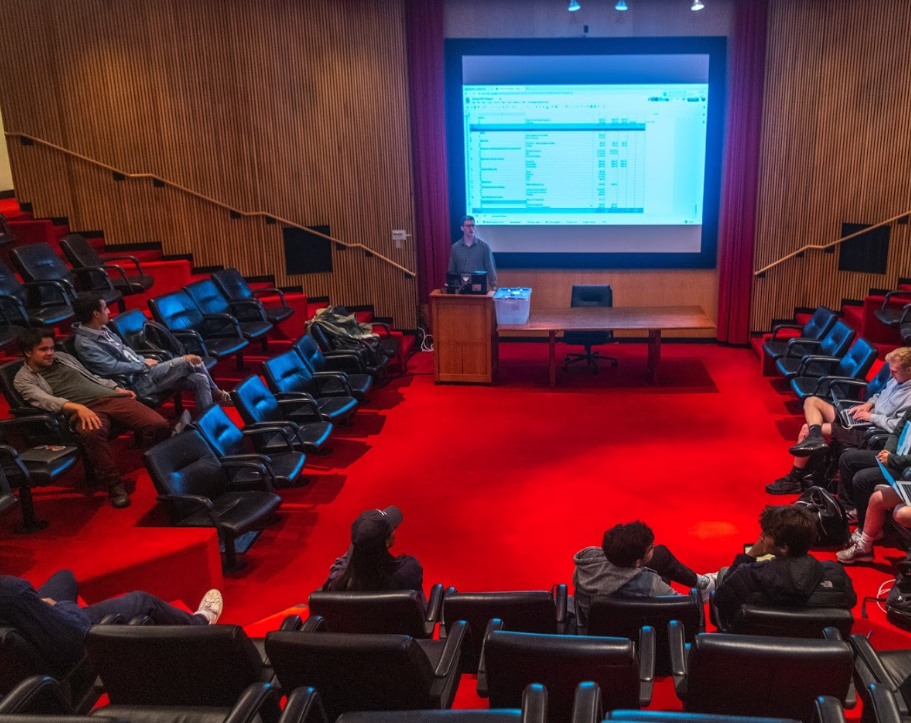Amherst College Republicans Appeals Sanctions From Judiciary Council

The executive board (E-board) of the Amherst College Republicans (ACR) has asked the Judiciary Council (JC) to appeal its decision last spring to sanction ACR after the Association of Amherst Students (AAS) was made aware of ACR GroupMe screenshots containing derogatory language toward LGBTQ students and staff. The request, however, has brought attention to the lack of a formalized process in the AAS constitution for directly appealing a JC decision.
Last spring, after The Student published screenshots of the club’s GroupMe chat, which showed ACR members making hateful and transphobic comments about the LGBTQ community on campus, the AAS filed a complaint to the JC. In early April, the JC announced its sanctions “based on reports of discriminatory language or hate speech,” according to the announcement made after the April 4 hearing.
The JC ordered ACR’s then E-board and E-board elects to step down from any and all E-board positions and release a statement in The Student “affirming that they condemn hate speech” before the end of the academic year. If the group did not take these actions, it would not be able to receive funding from AAS, the JC ruling said. The AAS constitution does not give JC authority to de-register student organizations.
ACR did not carry out any of the mandated actions.
Near the end of the spring 2019 semester, Sarah Melanson ’20, now-president of ACR, asked the JC to appeal its earlier decision, claiming that the punishment did not fit the crime. And she wasn’t the only one scrutinizing the JC’s decision.
Since the end of last semester, the JC has backpeddaled parts of the decision such as who on the E-Board should step down, while other sanctions, such as the mandatory anti-bias training for all RSOs, have yet to be implemented.
In an email exchange obtained by The Student, the JC clarified to a member of the ACR E-board that by originally declaring that “the current E-board and E-board elects of ACR must step down from their positions and will not be permitted to hold an E-board position in any RSO for the remainder of their time at Amherst,” the ruling required only a select few E-board members, not all, to step down from their positions. Two of the ACR E-board members sanctioned in the original decision graduated in the spring of 2019. One did step down from his position before the end of the year.
In an opinion piece published in The Student last spring, Chief of Student Affairs Karu Kozuma asked the AAS to more carefully reconsider the JC’s ruling.
“Neither the Judiciary Council nor the AAS has the authority to enforce the Amherst College Honor Code, which is cited as a foundational basis for the punitive measures that were announced,” he wrote. “The [measure of removing the ACR E-board from their posts on all RSOs] may have ripple effects that are punitive of other students and student organizations that have no relation to the underlying incident [JC] addressed in the measures.”
He added that he was concerned “there may also have been some procedural anomalies.”
The JC responded to Melanson’s request near the end of last semester stating that it had no power to appeal its own decision as outlined in the AAS constitution. Instead, the JC decision must be appealed by either a three-fourths majority in the AAS senate or a student-body referendum.
According to one member of JC who requested anonymity because they were not authorizd to talk to the press, “We were asked if it was possible to reverse our decision, but they did not offer any reason as to why we should, other than ‘it would be bad if we didn’t.’”
“In effect, we decided not to handle their appeal for two reasons,” the JC member added. “There is no appeals process for JC outlined in the constitution because JC is the final say in the matter and it doesn’t make sense for us to appeal our own decisions — but the senate can. They offered no new evidence. At the moment it comes down to what the senate will do.”
It is also unclear whether or not the senate could overturn the JC ruling. According to the AAS constitution, the senate cannot overturn cases in which it is a party, which in this case, it is — the senate is the party that originally brought the complaint against ACR.
“It’s a weird situation,” said AAS President Avery Farmer ’20. “It would be the senate overturning a sentence against the defendant to make it more lenient. A strict interpretation of the AAS constitution says they can’t do that.”
The lack of an appeals process for JC decisions has forced stakeholders to examine the function of the process in a governing body like the AAS.
“Appeals processes and evaluation of due processes are a part of any governing institution,” Director of Student Activities Paul Gallegos said in an email interview. “The current constitution predates me and the current AAS. [The] recent reevaluation of the AAS constitution by current leadership has been an earnest look at how it can be best aligned to serve the student community.”
“I think the JC should hear ACR’s appeal,” said Elizabeth Holubiak ’22, a member of ACR, in an email interview. “It sets a precedent for future cases. Granted the nature of each case varies, but the underlying process should be a constant that people can depend on.”
The JC branch plans to meet to propose a permanent appeals process, after which the JC chair will present the proposal to the senate for ratification.
Depending on the approved appeals process, the AAS will reconsider evaluating any outstanding appeals. As of now, ACR has not received any funding from the AAS.
“We’re in the unique situation of having to respond to some ambiguity in the AAS constitution. It’s a mess,” Farmer said.





Comments ()